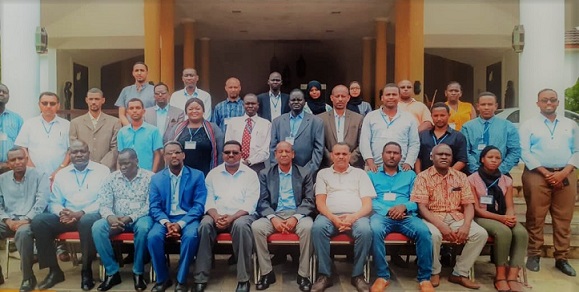Oct. 17, 2019 (MOMBASA, Kenya): The IGAD Security Sector Program (IGAD SSP) of the Intergovernmental Authority on Development (IGAD) today concluded a four-day training in Mombasa, Kenya with IGAD member states on border security and management in order to strengthen their capacity to address Transnational Security Threats (TSTs).

The training equipped participants directly working in border security, management and control, police and security, immigration, customs, coastguard, border police, port security or other related authorities with working knowledge and skills on effective border security, control and management as well as an understanding of regional and international border security and management frameworks and instruments including those of IGAD, AU, IOM, WCO, ICAO, UNODC, Interpol and GCTF.
During the official opening on Monday Commander Abebe Muluneh, Director of IGAD SSP expressed IGAD’s appreciation to member states for their effort towards having effective mechanisms to control illegal border crossing.
“We thank the Member Stated for relentlessly doing their best to improve border security and management models including One Stop Border Points, Joint operations, resource/infrastructure sharing mechanisms, information/intelligence exchange and others but as technology and countries develop, the more effort required from all stakeholders to work together and watch out for each other” Commander Abebe continued to say.
Mr. John Kilonzi, Director, Peace and Security Directorate in Kenya’s Ministry of Foreign Affairs reiterated that border security is not only to maintain border security but through it can ensure regional stability through effective mechanisms to stop and deter criminal networks seeking to profit from organized crimes yet at the same time facilitating legitimate movement of people and goods.
Borders in Africa are increasingly recognized, not just for their ability to facilitate easy movement of people and goods, but are centers with capabilities to detect, disrupt, interdict and control serious transnational crimes hence continue to be a priority for national governments, regional bodies and international organisations.
The participants were also exposed to contemporary border security and management principles, approaches and practices therefore being able to describe concepts, approaches and practices of community engagement in border areas to prevent and counter TSTs through intra-agency, interagency and regional/international cooperation and coordination.
Discussions also focused on practical cases of Standard Operating Procedures (SOP) in One Stop Border Post and single window system and the significance to address TSTs.
The regional training was with the financial support from the European Union Trust Fund (EUTF) through the IPSHAR Programme being implemented in partnership with the Austrian Development Agency (ADA).
